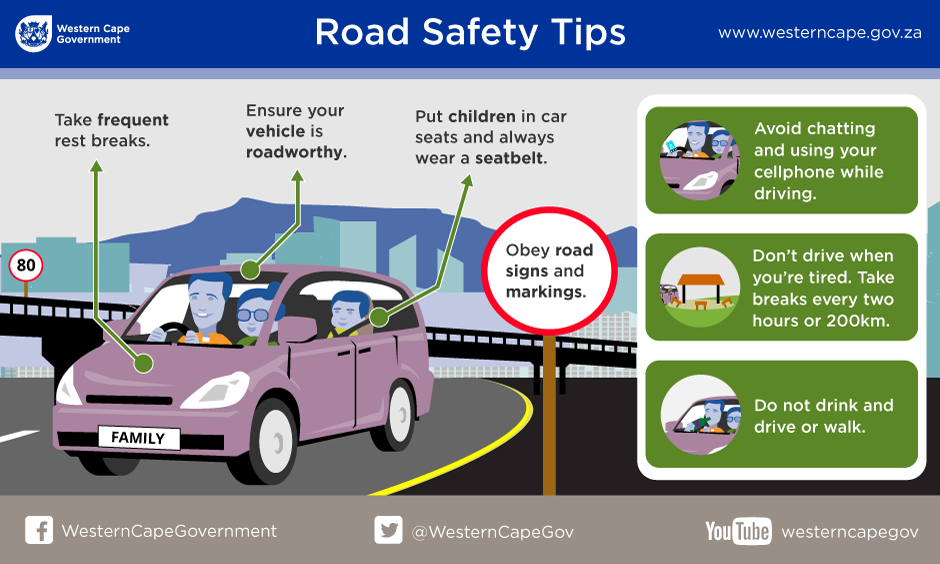Get to your destination on a high (way) by driving responsibly
Thousands of holidaymakers are already making their way to coastal and other destinations on the country’s national roads.
TEPA (Tyres, Equipment, Parts Association) vice chairperson Les Richardson reminds motorists that such roads are regulated differently to suburban roads, so it is important to be aware of things like minimum speeds, designated lanes and stopping in case of an emergency.

What is of foremost importance for motorists, he adds, is to ensure their vehicle is up to the journey.
“This should always be your starting point before embarking on a road trip. Well in advance of your departure, take your vehicle to an accredited workshop for a pre-holiday inspection,” advises Richardson.
The importance of this not only lies in the fact that you can have peace of mind that your car will not break down with a flat tyre or a mechanical fault on a highway, but because driving on national roads is unfamiliar territory for many drivers.
Another crucial thing to remember is that even if you are able to phone your insurance and get a breakdown service to assist, they will also have to negotiate the traffic before reaching you to offer help.
Richardson explains.
“When driving short distances on familiar routes, you know where the closest service station or police station is. Even if you travel on highways regularly and are comfortable with your route, holiday traffic and road conditions are always unpredictable.
“You could, for example, be caught in an unexpected traffic jam due to an accident, weather conditions or construction work, and find yourself unable to take a turn-off for a rest stop or safely stop to check a tyre or a noise in your engine – or, worse still, to put petrol in as your tank is flashing on empty.
“Despite what many people think, highway driving is not always fast driving. In fact, in peak periods due to the sheer volume of traffic it can be quite the opposite. This type of stop-start driving requires skill and patience.”
TEPA, a proud affiliate of the Retail Motor Industry Organisation (RMI), offers these 10 golden rules for safe highway driving:
- Always stick to the rules of the road and respect the fact that you are not the only driver on the road. Plan your route in advance, allowing for breaks to combat fatigue and always obey speed limits and adhere to traffic rules.
- Never underestimate your role in the free flow of traffic. If you cause even a minor bumper bashing or continually apply your brakes for no reason, it can cause delays for thousands of motorists behind you. Drive as if you are driving five cars and always be aware of the cars on either side of you as well as those in front of you and at the back of you.
- Keep your car in good condition. The highway is not a good place to break down. Make sure your engine, brakes, tyres, and indicators are all in 100% working condition. Good tyres are critical in enabling you to suddenly safely brake if needed or to traverse adverse weather conditions that make the road wet and slippery. Before you even leave do a pre trip check and if you are unsure about anything, don’t hesitate to contact a TEPA accredited fitment centre.
- Keep calm. Highway driving can be stressful but it is vital that you remain as calm as possible.
- Make use of navigation apps, social media and radio traffic reports for information about the route you are travelling to monitor possible problems ahead so that you can timeously find an alternative route if necessary.
- Focus on driving, not your cellphone. It is illegal to speak or text on a cellphone while driving to be holding a cellphone in your hand or with any other part of your body. Don’t be distracted. Taking your eyes off the road for a second or two can be fatal.
- Keep a safe following distance. It’s not always possible, especially in bumper-to-bumper traffic, but maintain as safe a distance as possible.
- Drive according to the conditions of the road and remember you are not there to enforce the rules of the road but to obey them.
- Keep your seatbelt on throughout your journey. Passengers also need to be secured and it’s law that toddlers under three must be in a car seat.
- Ensure you’re insured. Check your insurance cover thoroughly and know what cover you have so that there are no unexpected surprises should you need help or want to claim.
“Every driver on the road has a responsibility towards themselves, their passengers and other road users. A car in good condition is an important start, but no matter how well maintained your car is, it can’t prevent reckless or foolish driver behaviour.
“Be responsible about vehicle maintenance before you hit the road and be a responsible driver, especially on busy national roads this festive season,” Richardson concludes.





























